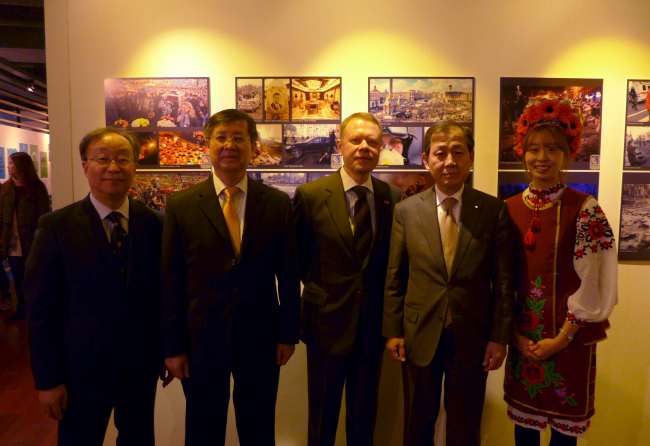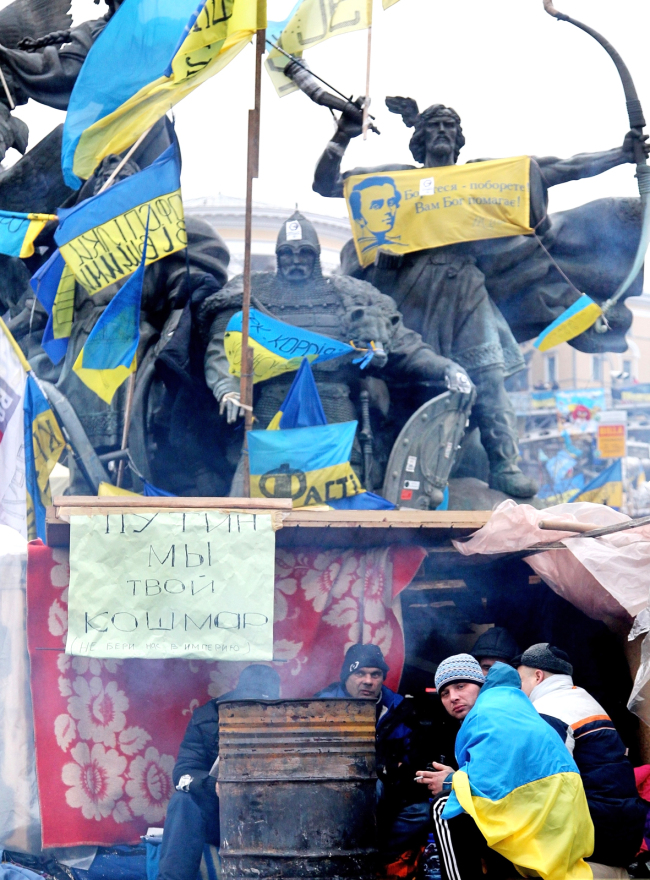Ukrainian exhibition marks ‘Revolution of Dignity’
By Korea HeraldPublished : Dec. 28, 2014 - 22:12
In Ukraine during the Euromaidan uprising last year, civil protests took the form of piano performances, painting and singing in front of riot police near the city square. The blue and yellow flags of Ukraine and the European Union were waved beside the smoke of burning tires and street food, with hardboiled Ukrainians bent on resetting the course of their country’s history.
Chanting “Glory to Ukraine, Glory to Heroes,” throngs of nationalists congregated in Independence Square in central Kiev, demanding the resignation of former President Viktor Yanukovych and the dissolution of his government and the signing of the Association Agreement to strengthen diplomatic, commercial, security and cultural ties with the EU.
In what came to be known as the Euromaidan movement, the civic revolt against an “entire political system based on misgovernance, rent-seeking and corruption” laid the groundwork for Ukraine’s embrace of universal values based on human dignity, freedom and democracy.
Chanting “Glory to Ukraine, Glory to Heroes,” throngs of nationalists congregated in Independence Square in central Kiev, demanding the resignation of former President Viktor Yanukovych and the dissolution of his government and the signing of the Association Agreement to strengthen diplomatic, commercial, security and cultural ties with the EU.
In what came to be known as the Euromaidan movement, the civic revolt against an “entire political system based on misgovernance, rent-seeking and corruption” laid the groundwork for Ukraine’s embrace of universal values based on human dignity, freedom and democracy.

The Hanguk University of Foreign Studies’ Ukrainian studies department in collaboration with the Ukrainian Embassy and Ukraine Culture and Art Council is hosting the “Revolution of Dignity Photo and Poster Exhibition” to celebrate the event’s first anniversary at the university’s Imun Campus from Dec. 8-Jan. 22.
“This milestone event responded to Ukrainian people’s aspirations and opened a new phase of nation-building in our history in line with values of democracy, rule of law and respect for human rights,” Ukrainian Ambassador to Korea Vasyl Marmazov said in a keynote speech at a reception ceremony on Dec. 19. “Fair, transparent and democratic presidential and parliamentary elections were held in Ukraine this year, despite our ongoing fight for territorial integrity and sovereignty in the eastern part of Ukraine from Russian aggression.”
“Maidan,” the main square of Kiev, was combined with European aspirations to create the portmanteau Euromaidan, initially used as a hashtag on Twitter. As the protest unfolded, it quickly came to symbolize the “act of public politics itself.”
Ukrainian historian Yaroslav Hrytsak likened the movement to the Occupy Wall Street movement in New York, led by “young people who are very well educated, active in social media and mobile, but who don’t have futures.”
“Most Ukrainians supported Maidan and our new government that embraces pro-European values,” said Aleksandr Shin, 19, a freshman at Seoul National University and a fourth-generation Korean-Ukrainian, who participated in the exhibition. “The old government was based on the ruins of soviet-Ukrainian government. We needed something fresh.”
Shin added, “As a result of the uprising, Ukraine now faces an economic crisis, which didn’t exist before. But people believe it was worth it because we now have a new system of government.”

The revolution was marked by a generational divide: While most young people with a pro-European view supported the movement, those over the age of 50 were opposed to it, according to a December 2013 poll. There were also regional divisions, with the majority in Kiev and central and western Ukraine in support and those in Crimea and eastern and southern Ukraine opposed.
The protests reached their climax in mid-February with police and protesters exchanging gunfire, using live ammunition and rubber bullets. On Feb. 22, the parliament impeached Yanukovych, who had fled the country a day before. Yulia Tymoshenko, Ukraine’s first female prime minister (2005, 2007-2010), was released in February after more than two years of imprisonment and Petro Poroshenko was elected president in June.
Nearly 80 people were killed, 570 were injured and hundreds of thousands were displaced, according to the United Nations.
HUFS’ Ukrainian studies department professor Hong So-gu, who organized the event, said, “Euromaidan was not a rampage by fundamentalists, but a social revolution calling for human dignity. Folk symbols and art were used by demonstrators, with Christmas trees being turned into protest canvases with posters and slogans.”
The root cause behind the popular eruption was the failure of the Orange Revolution 10 years earlier to achieve a clean break from the communist era, Hong stressed.
Just as Korea underwent nearly 60 uprisings and revolutions to achieve democracy ― culminating in the 1980 Gwangju Democratization Movement and June 1987 Democracy Movement ― the success of the movement will depend on Europe’s support, democratic structural reforms, implementation of antigraft laws and an entire “culture change” of society, according to Hong.
Regarding the new Ukraine, Hong emphasized that Korean government and business communities can take advantage of the country’s advanced aerospace, missile and information technologies as well as its rich natural resources, agriculture and affordable land.
“We need to depart from our Russia-centered diplomacy and pursue pragmatic diplomacy. Facing the Black Sea, Ukraine can be used as an outpost to Europe,” Hong said. “Korean companies can invest in IT-based infrastructure, transportation, manufacturing and energy sectors in addition to selling electronic products.
“The biggest threat is market instability arising from the Crimean crisis. The overall situation is one of Europeanization, of which market transparency and stability are critical. Politically, people’s aspirations for democracy should lead to the formation of political parties, policies and laws.”
By Joel Lee (joel@heraldcorp.com)
-
Articles by Korea Herald








![[New faces of Assembly] Architect behind ‘audacious initiative’ believes in denuclearized North Korea](http://res.heraldm.com/phpwas/restmb_idxmake.php?idx=644&simg=/content/image/2024/05/01/20240501050627_0.jpg&u=20240502093000)










![[Today’s K-pop] Sunmi to drop single next month](http://res.heraldm.com/phpwas/restmb_idxmake.php?idx=642&simg=/content/image/2024/05/03/20240503050545_0.jpg&u=)